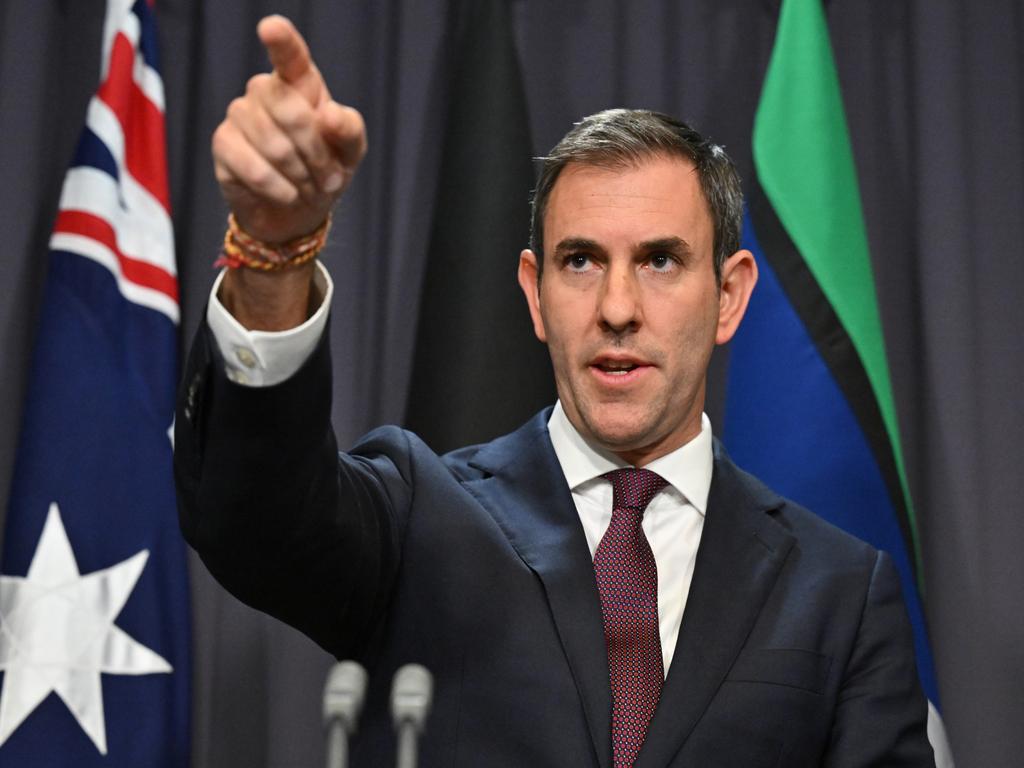Jim Chalmers’ task gets harder with Covid backdown

For many seasoned observers, this triggered campaign flashbacks: the forgotten unemployment figures, reading policy plans from crib notes and an apparent lack of message control.
The government will get away with it, it’s early days, but clearly it is hard to stay grounded and in touch when so much time has been spent at 40,000 feet, earning the Prime Minister the unfair meme of Anthony Oversease.
The object lesson in all this wasn’t just that Albanese was prepared to hang out his Health Minister and Treasurer so obviously with the policy backflip. He had Mark Butler and Jim Chalmers doubling down arguing against extending the Morrison government’s Covid leave entitlements. Clearly, if you aren’t on the Albo bus you’re going to be under it.
The lesson for Chalmers will be how best to use next week’s economic statement of “doom and gloom” as a precursor to his first budget in October.
Labor was elected with a mandate of “cutting the waste and the rorts”. But one person’s rort is another’s vital business subsidy. Sure, we might have plenty of budgetary waste, but each of those mendicant causes now will know you can flip the Albanese government with only a few days of concerted pressure.
Interest groups will hear the line “trillion-dollar debt” and “good ideas we can’t afford” as merely opening lines of the negotiations, just as premiers and a few union leaders brought a national cabinet forward from October to this past Monday, and then to last Saturday in a fit of Pacific pique.
Chalmers and Finance Minister Katy Gallagher’s joint task is to deliver Labor’s modest election mandate by finding the savings in the budget.
Australia is heading uncomfortably beyond a trillion-dollar federal debt. Chalmers delivered a sobering perspective that taxpayers now pay an annual interest bill that dwarfs the expenditure on the National Disability Insurance Scheme and Medicare. That’s the collective cost of pandemic responses and a deteriorating global economic environment.
As a nation, we don’t have the budgetary firepower to face down another global financial crisis or Covid lockdown. We can’t buy our way out of the next crisis. As I said during the campaign, Chalmers is one of Labor’s star performers. He has the intellectual clout and multi-decadal hands-on experience in Canberra as a staff member, chief of staff and shadow minister to give him the perspective needed to shape the budget and Labor’s economic plan.
The budget needs to be a uniting document for Labor. It won’t survive if the government doesn’t hold its nerve against the carping and moaning of special interests in the face of cuts to waste and rorts. That includes premiers who have been happy to see cost-shifting to the federal government in a range of areas that have improved their state bottom lines at the expense of taxpayers everywhere.
Chalmers has a none-too-hidden desire to be prime minister, a worthy ambition. His first budget will form the application process and it will be tested by his caucus colleagues, the crossbench and the opposition.
Treasurer is a hard and high-profile gig but, as Paul Keating and John Howard showed, you can be treasurer and become prime minister. There is also the example of Peter Costello, who despite so much promise as treasurer never made it to the top job.
In addition to the budget, Chalmers, along with his Queensland counterpart, Cameron Dick, faces the delicate and highly political approvals process for the proposed Suncorp acquisition by ANZ. Keeping talent in Queensland is a stated aim of Dick, who wants to build a financial services hub in his state.
Suncorp holds a special place for Queenslanders and was formed to provide a financial powerhouse that was headquartered in Brisbane. It was amalgamated by then treasurer Joan Sheldon when Steve Johnston, now Suncorp’s chief executive, was Queensland premier Rob Borbidge’s chief of staff.
Suncorp also was the catalyst for federal treasurer Wayne Swan, with fellow Queenslander and prime minister Kevin Rudd, to deliver the bank deposit guarantee during the GFC to stop a run on key regional banks. Chalmers was deputy chief of staff to Swan at the time.
Finally, Labor Holdings, the bedrock of the ALP Queensland branch’s finances and election funding, holds the lion’s share of its wealth in Suncorp shares. ANZ no doubt had this all in mind as it backflipped out of the acquisition of software specialist MYOB and into Suncorp.
Suncorp is a well-run bank that largely avoided the criticism of the Hayne royal commission, but it’s worth noting the stories of hardship from BankWest customers following the Commonwealth takeover. Suncorp is a bulwark against further bank consolidation and fewer competitive services being provided into regional Queensland towns. Queensland small businesses and farms rely on having Suncorp there for them.
The budget and the Suncorp decision will be about balancing short-term politics and sound public policy, and both will define Chalmers.
His first budget and looking after Queenslanders with the Suncorp decision will be key moments in fulfilling his ultimate ambition of being prime minister.







The realpolitik of governing in a pandemic brought the Albanese government back to earth last Saturday. The rushed and messy decision to extend Covid leave payments was the right decision and it was the populist one, so why did it take the new government five excruciating days to land it?